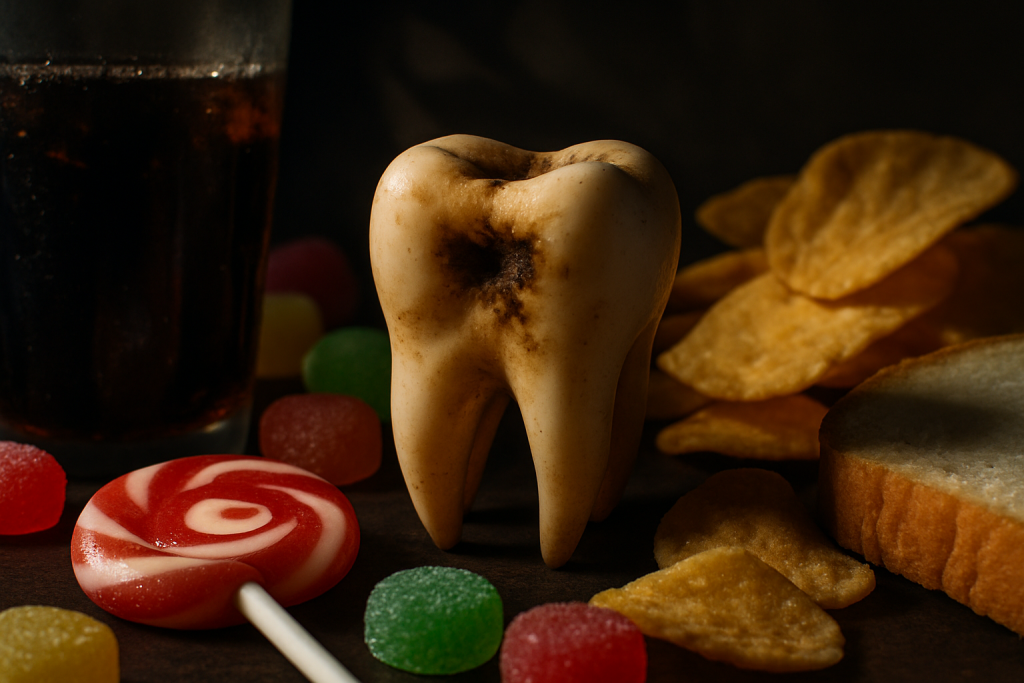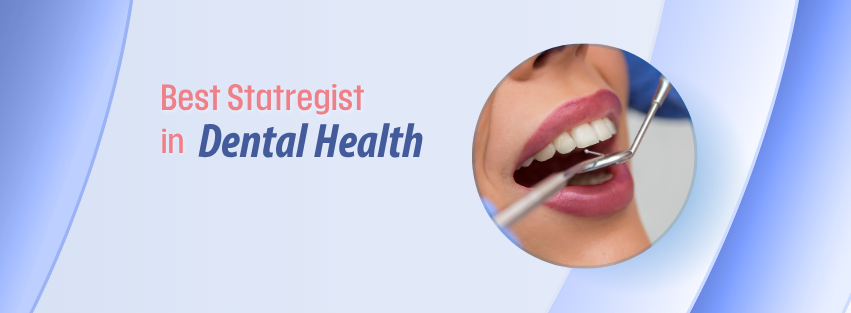
The role of key minerals in reversing tooth decay:
Tooth decay is a common problem that affects many people, often leading to pain and expensive dental work. However, certain minerals can play a significant role in reversing this issue. By incorporating these vital nutrients into your diet, you can help strengthen your teeth and promote overall oral health.
Calcium: The foundation of strong teeth
Calcium is essential for building and maintaining strong teeth. It helps fortify tooth enamel, the outer layer that protects your teeth from decay. When enamel is weakened, it can lead to cavities. By ensuring you get enough calcium daily, you can help protect your teeth from the harmful effects of acids produced by bacteria in the mouth.

Good sources of calcium include:
- Dairy products like milk, cheese, and yogurt
- Leafy greens such as kale and spinach
- Fortified plant milks
- Canned fish with bones, like salmon and sardines
Phosphorus: A partner to calcium.
Phosphorus works closely with calcium to build strong bones and teeth. It helps in the remineralization process, which restores lost minerals to your enamel. This mineral helps neutralize acids in the mouth and encourages a healthier saliva flow, which can help clear out food particles and bacteria. You can find phosphorus in foods such as:
- Meat and poultry
- Fish
- Nuts and seeds
- Whole grains
Fluoride: Nature’s cavity fighter.
Fluoride is a mineral that plays a critical role in preventing tooth decay. It works by making the tooth more resistant to acids attacking the enamel. Additionally, fluoride can reverse early signs of decay by promoting the remineralization of affected areas. Fluoride can be found in:
- Fluoridated tap water
- Toothpaste with fluoride
- Some mouth rinses
- Dental treatments by professionals
Vitamin D: Enhancer of mineral absorption
Although not a mineral itself, vitamin D is crucial for maximizing the benefits of calcium and phosphorus in your body. It enhances calcium absorption in the gut and ensures that enough calcium is available to form strong enamel. Without adequate vitamin D, your body may not effectively utilize the minerals necessary for tooth health. To boost your vitamin D intake, consider:
- Sun exposure, which helps your body produce vitamin D naturally
- Fatty fish like salmon and mackerel
- Fortified foods such as orange juice and cereals
- Supplements, if necessary
Magnesium: A supporting mineral.
Magnesium is another mineral that supports the structure of your teeth and bones. It works alongside calcium and phosphorus to maintain healthy bone density and assists in the proper functioning of nerves and muscles surrounding your teeth. Including magnesium-rich foods in your diet can contribute to better dental health. Good sources of magnesium include:
- Nuts, especially almonds and cashews
- Legumes like black beans and chickpeas
- Whole grains
- Dark chocolate
Selenium: Protecting your gums.
Selenium is an antioxidant that helps protect your body from oxidative stress, which can affect oral health, particularly your gums. Healthy gums are critical for preventing tooth decay and supporting your teeth. Foods rich in selenium include:
- Brazil nuts
- Seafood
- Eggs
- Sunflower seeds
These minerals into your diet can significantly contribute to reversing tooth decay and maintaining overall oral hygiene. By focusing on a balanced diet rich in these essential nutrients, you are taking a proactive approach to prevent future dental issues.
Remember, while minerals play a vital role, proper dental hygiene practices such as brushing twice a day, flossing daily, and visiting your dentist regularly are equally important in combating tooth decay.
Natural sources of minerals for dental health:
Your dental health is closely tied to the minerals you consume. Minerals play a crucial role in maintaining strong teeth and overall oral health. By ensuring you get the right natural sources of minerals, you can promote remineralization and potentially reverse tooth decay.
Calcium stands out as an essential mineral for your dental health. This vital component helps form and maintain the structure of your bones and teeth. When you incorporate calcium-rich foods, like dairy products, leafy greens, and almonds, into your diet, you provide your body with the building blocks it needs to keep your teeth sturdy. Cheese, in particular, is beneficial as it helps balance pH levels in your mouth, reducing the risk of decay.
Phosphorus is another key mineral that supports dental health. It works closely with calcium to strengthen enamel and promote healthy teeth. Natural sources of phosphorus include meat, fish, poultry, eggs, nuts, and whole grains. Consuming these foods can help maintain the balance of minerals in your mouth, contributing to overall dental longevity.
Magnesium is also important for your teeth. It aids in the absorption of calcium and phosphorus, making sure that these minerals work effectively together. Foods rich in magnesium include seeds, nuts, whole grains, and green leafy vegetables. By adding these items to your diet, you can enhance your dental health alongside your general well-being.
Vitamin D deserves special mention as well. While it’s not a mineral itself, it is essential for mineral absorption. Without adequate vitamin D, your body struggles to absorb calcium effectively. Fatty fish, egg yolks, and fortified foods are great sources of vitamin D. By ensuring you get enough sunshine and including these foods in your meals, you can optimize your mineral intake for stronger teeth.
Fluoride is another crucial element for tooth health. It helps to strengthen enamel and remineralize areas of decay. While many people get fluoride through tap water or dental products, natural sources include seafood and tea. Regular exposure to fluoride, whether through diet or dental care products, is vital for preventing cavities.
In addition to these minerals, silica plays a noteworthy role in dental health. It helps strengthen connective tissues and may assist in the overall structural integrity of your teeth and gums. Foods like oats, cucumbers, and leafy greens provide natural sources of silica to bolster your oral health.
Maintaining a balanced diet filled with natural sources of minerals is your path to healthy teeth. When you prioritize these nutrients, you empower your body to fend off dental issues effectively. By making simple changes to your diet and hygiene routine, you can enjoy brighter smiles and healthier teeth.
The Science behind remineralization of teeth:
Understanding the ways our teeth can heal is essential for maintaining oral health. The process of remineralization plays a vital role in reversing early stages of tooth decay. This natural repair mechanism involves depositing minerals back into the enamel, the outer layer of our teeth. Let’s explore how this process works, why it matters, and how to support it.
These minerals work together to form hydroxyapatite, a complex mineral that is essential for the strength and integrity of tooth enamel. When you consume foods or beverages rich in these minerals or use dental products infused with them, you can aid and promote the remineralization process.
The process of remineralization:
Remineralization occurs in several stages:
- Demineralization: This happens when acids from food and drinks attack enamel, stripping it of minerals.
- Neutralization: Saliva plays a key role in neutralizing acids. It contains minerals and proteins that are vital for tooth repair.
- Reabsorption: The enamel absorbs the necessary minerals back into its structure, restoring its strength and resilience.
This cycle of demineralization and remineralization is ongoing. However, if the demineralization outpaces remineralization, it can lead to cavities and further dental issues.
Factors influencing remineralization:
Several factors can promote or hinder the remineralization process:
- Diet: Foods rich in calcium and phosphate, such as dairy products, leafy greens, and nuts, aid remineralization. Contrarily, sugary or acidic foods can accelerate demineralization.
- Saliva Production: A dry mouth can limit the natural healing properties of saliva. Staying hydrated and chewing sugar-free gum can help stimulate saliva flow.
- Oral Hygiene: Regular brushing with fluoride toothpaste can remove plaque and provide essential minerals to support tooth health.
Supporting the remineralization process:
To give your teeth the best chance for remineralization, consider the following tips:
- Use Fluoride Products: Opt for toothpaste and mouth rinses that contain fluoride to boost the remineralization process.
- Eat a Balanced Diet: Incorporate calcium-rich foods into your meals. Cheese, yogurt, and green leafy vegetables are excellent choices.
- Limit Sugary Snacks: Try to reduce the intake of sweets and acidic beverages to allow your enamel a chance to recover.
- Stay Hydrated: Drink plenty of water throughout the day to help flush away food particles and maintain saliva production.
- Regular Dental Check-ups: Routine visits to your dentist can help catch early signs of decay and provide personalized advice for your oral health.
Stay hydrated with mineral-rich water:
Your choice of water can also affect your dental health. Opt for mineral water or water with added fluoride when possible. Here’s how to hydrate effectively:
- Mineral Water: Drinking mineral water can provide additional sources of calcium and magnesium.
- Limit Sugary Drinks: Avoid excessive consumption of sodas or sweetened beverages, as they can erode enamel and increase decay risk.
Incorporate friendly foods into your snacks:
Choosing the right snacks can help maintain your minerals while satisfying your cravings. Consider these friendly options:
- Greek Yogurt: A great way to boost calcium while enjoying a tasty treat. Add fruits or honey for added flavor.
- Carrot Sticks with Hummus: Enjoy the crunch of carrots paired with hummus. This snack is not only delicious but also contains essential minerals.
- Apple Slices with Almond Butter: Combine sweet and nutritious apple slices with almond butter for a satisfying, mineral-rich snack.
These minerals into your diet doesn’t have to be challenging. By making simple adjustments to your meals and snacks, you can significantly strengthen your teeth. Remember, a strong diet not only benefits your teeth but also supports your overall health. Start today, and your smile will thank you!
Conclusions:
Tooth decay is a common issue, but understanding how key minerals play a vital role in reversing this condition can empower you to take charge of your oral health. Essential minerals like calcium, phosphorus, and magnesium work together to strengthen tooth enamel and promote remineralization, making them crucial for fighting decay. By prioritizing natural sources of these minerals, such as dairy products, leafy greens, nuts, and fish, you can nourish your teeth effectively.
Recognizing the impact of mineral deficiency on your oral health is equally important. Insufficient levels of these minerals can lead to weakened enamel and increased susceptibility to cavities. Therefore, ensuring your diet is rich in these nutrients becomes an essential part of maintaining your dental health.
